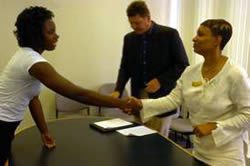High schoolers explore allied health careers at ECU
Area high school students have been learning about allied health careers and college life through an East Carolina University summer program set to end July 15.
The Allied Health Careers Opportunity Program, or AHCOP, is sponsored by the School of Allied Health Sciences and the Interdisciplinary Rural Health Project at ECU. The program is offered to students for two years and began in 2003. It has been funded for three years through a $942,675 U.S. Department of Health and Human Services grant.
Forty-three students participated in the first year in 2003. In 2004, 31 students returned for their second year, and 38 new students started. Of those, 22 students from 10 northeastern North Carolina high schools returned this summer to complete their second year. It is geared toward academically or economically disadvantaged students with a 3.0 or better grade point average with an interest in allied health professions. Academically challenged is defined as attending a rural high school, according to the grant guidelines.
2005 participants included the following, listed under their high schools:

Latayvia Manning, left, a D.H. Conley High School student, hones her skills during a mock interview session held July 7 in Mendenhall Student Center at East Carolina University.
Ayden-Grifton
Kimani Monk and Shea Webster
Bertie
Ashley Berryman and Marquita Moore
D.H. Conley
Latayvia Manning
Farmville Central
Austin Banaszak, Nicole Chapman and Tanisha Suggs
Gates County
Whitney Babb and Leigh Ann Byrum
Hertford County
Kashek Hardy, Katorra Liverman and Whitney Thomas
North Pitt
Portia Purvis, Nicole Roy, Leslie Sugg and Britney Tyson
Northside
Rodgriguez Stanley
South Central
Tori Moore
Washington
Chelsea Corey, Jessica Hardison and Latora Pruden
While in the program, students live in ECU dormitories to experience college life. They follow allied health professionals in the field and learn more about clinical laboratory science, community health education, health services and information management, human nutrition and dietetics, occupational therapy, pharmacy, physical therapy, physician assistant, rehabilitation counseling and speech-language pathology and audiology.
In addition to traditional educational classes, workshops are held on reading and writing improvement, SAT/ACT preparation, interpersonal seminars, time management, public speaking, applying to college and securing financial aid. The program seeks to diversify the student body of the School of Allied Health Sciences, according to Cathy Howell, project coordinator.